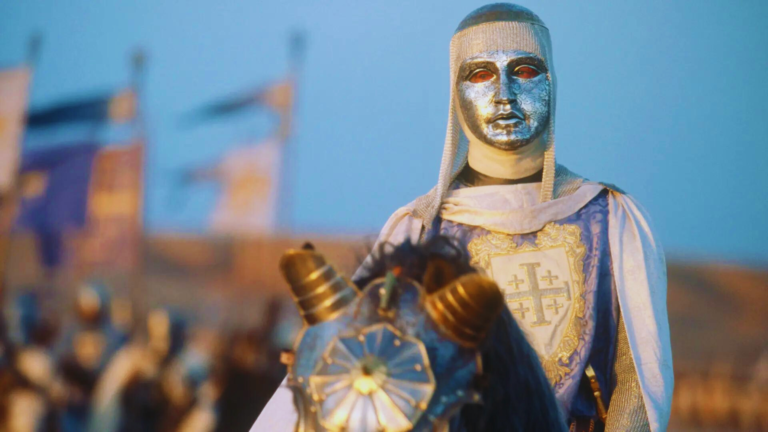In the vast landscape of historical epics, “Kingdom of Heaven” stands as a towering edifice, captivating audiences with its grandeur, intricate storytelling, and timeless themes. Released in 2005 and directed by the visionary Ridley Scott, this cinematic masterpiece takes us on a journey through the tumultuous times of the Crusades, weaving together the threads of honor, faith, and the quest for redemption. The movies casts and showcases amazing talents of actors like Orlando Bloom, Liam Neeson, Eva Green, Jeremy Irons and short but fascinating screen time by Edward Norton.
Edward Norton didn’t want to be credited for his role in Kingdom of Heaven, as he felt it would add mystery to the character of Baldwin IV.

The Historical Canvas
Set in the 12th century during the Crusades, “Kingdom of Heaven” paints a vivid picture of the clash between Christian and Muslim forces for control over the Holy Land. The story mainly revolves around Balian of Ibelin, Against this backdrop of religious fervor and political intrigue, the film delves into the complexities of human nature, portraying characters who grapple with their beliefs, desires, and destinies.
The Protagonist's Odyssey
At the heart of the narrative is Balian of Ibelin, portrayed with depth and nuance by Orlando Bloom and his journey from being a blacksmith to defending Crusader Kingdom of Jerusalem from Ayyubid Sultan Saladin. Thrust into the midst of the Crusades, Balian undergoes a transformative journey as he grapples with questions of identity, morality, and the nature of power. His evolution from a reluctant hero to a noble leader is a testament to the film’s exploration of inner conflict and moral courage.
Themes of Honor and Sacrifice
“Kingdom of Heaven” resonates with themes of honor, sacrifice, and the quest for righteousness. Whether it’s the knightly code of chivalry upheld by characters like Balian and Sir Godfrey, or the steadfast devotion to faith exemplified by Salahuddin and his followers, the film explores the myriad ways in which individuals define and defend their principles in the face of adversity. Also the courageuous journey of King Baldwin IV of Jerusalem, also known as “The Leaper King” cause of his battle with Leprosy. He is famously known as his first victory at the mere age of 16.
Interfaith Dialogue and Understanding
One of the film’s most poignant aspects is its portrayal of interfaith dialogue and understanding amidst the backdrop of religious conflict. Through Balian’s interactions with characters of different faiths, including the wise Muslim leader Salahuddin, “Kingdom of Heaven” advocates for empathy, tolerance, and the recognition of our shared humanity beyond religious divides.
Cinematic Craftsmanship
Ridley Scott’s masterful direction and the film’s breathtaking visuals transport viewers to the medieval world with unparalleled grandeur. The film was produced with a budget of $130 million and grossed $218 million worldwide. From the sweeping landscapes of the Holy Land to the intricately choreographed battle scenes, every frame of “Kingdom of Heaven” is a testament to the craftsmanship and is important to depict the film in it’s truest form. A director’s cut version of the film was also released that many viewers say, defines the authencity of the film.
Legacy and Contemporary Relevance
Though set in the distant past, “Kingdom of Heaven” resonates with contemporary relevance, offering insights into the enduring nature of conflict, the search for meaning in a chaotic world, and the potential for reconciliation amidst seemingly insurmountable divides. As we navigate our own challenges and confrontations, the film serves as a reminder of the power of empathy, courage, and the pursuit of peace.
“Kingdom of Heaven” endures as a cinematic triumph, captivating audiences with its epic scope, rich characters, and timeless themes. Through its exploration of honor, faith, and the human spirit, the film invites us to reflect on our own journeys and the choices that define our destinies. In an age marked by division and discord, its message of understanding, compassion, and the quest for righteousness remains as relevant as ever, reminding us of the enduring power of storytelling to illuminate the depths of the human experience



